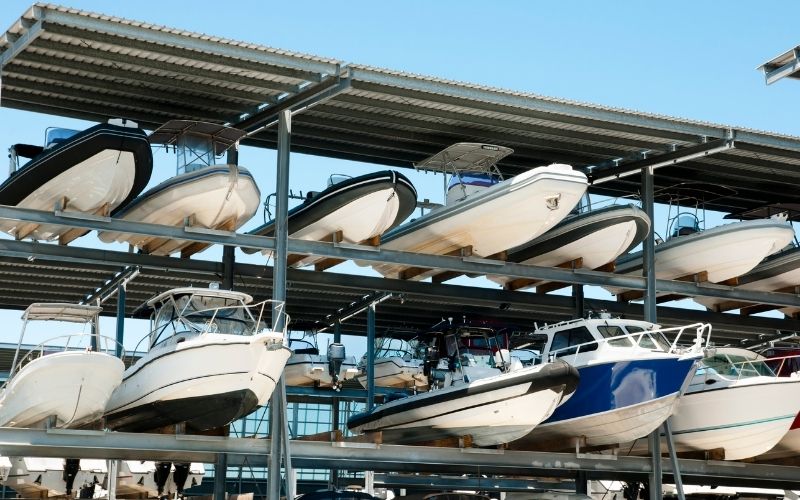If you’re planning on purchasing a RIB boat or already have one, you may want to learn how to store them properly.
Proper boat storage ensures that your RIB boat stays buoyant for many years to come.
Furthermore, it keeps the rubber from cracking, drying out, and rotting. Not to mention, you’ll prevent mildew and mold.
This article will answer any common questions you may have about how to store a RIB boat properly.
Let’s begin!
Table of Contents
Can you store a RIB boat outside?
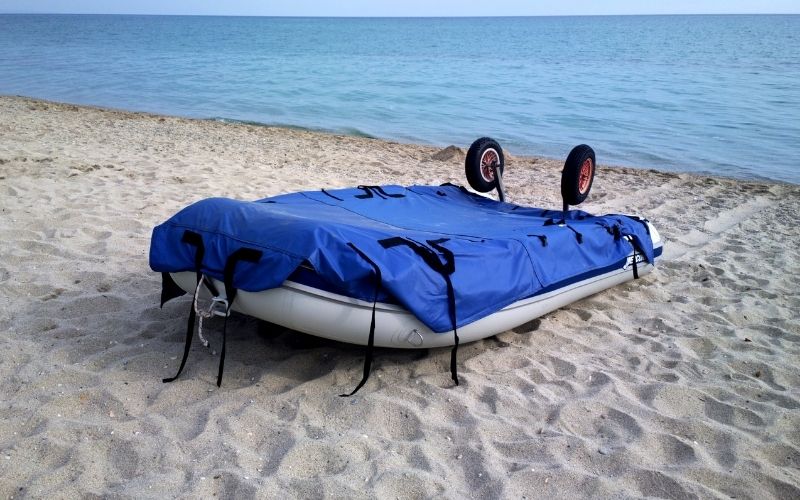
Yes, RIB boats can be stored outside; however, you’ll need to take some precautions when doing so.
Storing your RIB boat inside is the best option. Plastic and rubber materials do not mesh well with sunlight, especially in warm environments where the sun can be very potent.
Ideally, you’ll want to store your boat inside and in a dry place to prevent the chances of mold and mildew forming. As a result, you’ll maximize the lifespan of your RIB.
If you don’t have a big garage, rent a storage unit to protect it from bird droppings, rain, sun, and anything else that can put the vessel in harm’s way.
Always Leave a Cover On

If you opt to store your boat outside, you need to find a RIB cover that can withstand harsh weather conditions and won’t come off.
In addition, you should consider a boat cover that offers UV protection so that your boat doesn’t receive sun damage.
Where there could be severe snow and strong winds, you should opt to have your RIB shrink-wrapped.
These are a one-time use cover; however, it provides heavy-duty protection against the effects of snow and rain.
Can you leave a RIB in the water?
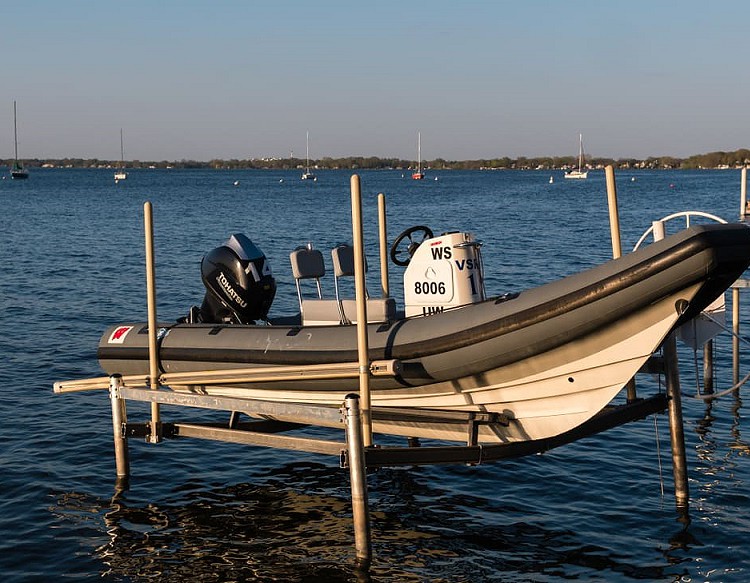
Most boat owners love to leave their boats docked in the water, which is much more convenient than transporting it around.
However, storing a RIB boat is entirely different from bigger vessels like Yachts or Speedboats.
If you have to store your boat out in the waters, you’ll want to take preventative measures to keep your boat from damage and deterioration.
First, consider whether you’re leaving it in salt or freshwater. We advise against leaving your boat in saltwater since the corrosive elements can damage the engine and boat material.
In fact, after every saltwater use, you should be flushing your engine with fresh water.
In addition, do not leave the RIB in the water during cold days. Freezing temperatures can cause water in the engine to freeze.
Make sure to disconnect the battery to help extend its life.
Furthermore, you should place a cover on it to protect the deck and inside.
Consider adding a waterproofing spray and added UV protection to the boat cover. Over time, the saltwater droplets and sun’s UV rays can wear down the waterproof coat of the boat cover.
To prevent marine growth and galvanic corrosion, we advise tilting the outboard engine up and out of the water.
Marine life forms such as seaweed, algae, and barnacles can attach and grow across any part of the boat submerged inside the water. As a result, this can ruin the efficiency of the propeller and causes additional drag in the water.
Marine growth occurs more rapidly in saltwater and warmer climates.
Galvanic corrosion is when a metal corrodes while in contact with an electrolyte. This occurs when the outboard engine makes contact with electrolytes in the saltwater.
Should you store a RIB inflated?
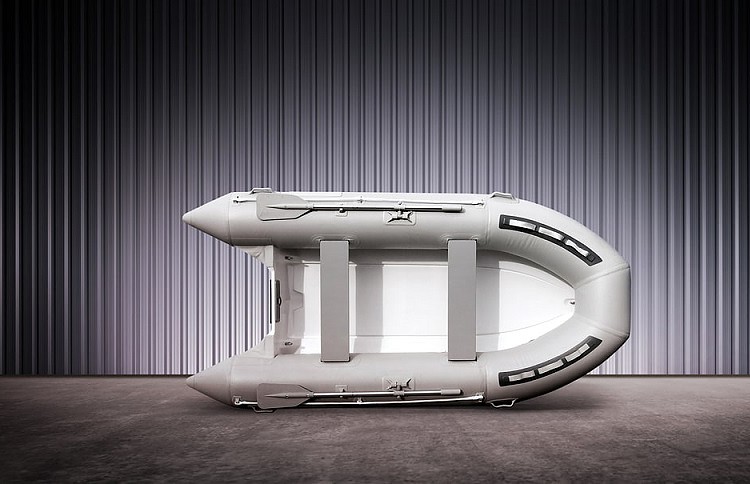
Many inflatable boat owners tend to get confused about whether they should leave their boat inflated or deflated when the weather gets cold.
We recommend keeping your boat inflated if possible.
That’s because the RIB will be more resistant to getting punctured. RIB tubing is the strongest while inflated, and can withstand more in this state.
Avoid inflating the boat halfway since that leaves the boat vulnerable to punctures from sharp objects or rocks in the water.
You should periodically check the air pressure to see if you need to add more. Air pressure can slowly release when temperatures drop.
These are recommendations for storing your RIB boat inflated, but there are a few ways to store it deflated as well.
How to store your RIB boat deflated?
You should only store the inflatable dinghy deflated for short periods until you can safely move it somewhere where it can be inflated.
Here are a few things you need to consider when storing the RIB deflated:
- Before storage, make sure to wash the boat thoroughly. While you’re out in the water, your vessel attracts microorganisms and residue that should be washed off.
- Wipe down the boat after the wash and store it dry. Lingering moisture can lead to mildew and mold.
- Keep it away from anything that could puncture the boat.
- Avoid storing your inflatable dinghy in a metal shed. If you do, make sure the storage room is insulated. Many storage facilities or garages can be prone to large temperature swings, which puts stress on the seams and tubing material of the boat.
How to store a RIB boat for winter?
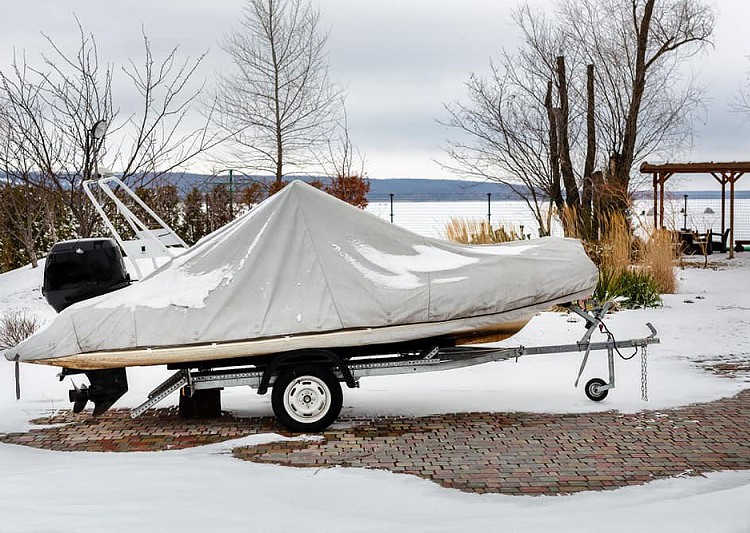
As the temperature begins to drop, you’ll need to know how to store your rigid inflatable boat.
New owners don’t realize that harsh weather and sub-zero conditions can cause significant damage to your dinghy.
When leaving your RIB boat outside, some boat owners mistakenly use space heaters or light bulbs to heat their boat, which can, unfortunately, result in a fire.
Prepare Your Mechanical Systems for Winter
Besides storing your boat inflated and using the right type of cover, you’ll need to prepare your boat’s mechanical systems for the winter.
Keep in mind that even if you move your boat indoors, you’ll still want to winterize your RIB boat. Storing it indoors doesn’t guarantee that the boat won’t freeze.
Winterization helps to prolong the lifespan of the RIB and protect its quality.
Outboard Engine

Most RIBs include an outboard engine. And if you don’t plan on using your engine all winter, you’ll have to winterize the outboard motor.
Winterizing the outboard motor means preventing possible damage when not in use, which is a common cause of motor failure.
Failing to winterize your boat’s engine can lead to complications.
Here are the steps to winterize the outboard engine:
- Drain all the water out of your boat. Even a small amount of water can freeze and damage your boat. Consider adding a as an extra layer of protection.
- Rinse and wipe down the engine to knock off the salt, dirt, and grime accumulated on the engine. Using a dry cloth, remove the excess grease and water until dry.
- Periodically perform maintenance on them, such as greasing the pivot shaft and steering shaft to prevent wearing of the components and saltwater intrusion.
- Whether you own a two-stroke or four-stroke engine, changing the oil in the lower unit is imperative. Old oil may have contaminants that lead to engine failure or a decrease in performance.
- Tilt the engine downward to flush the engine’s cooling system thoroughly.
- If your RIB has a four-stroke engine, you’ll need to change the oil filter and engine oil before winter. Check the manufacturer’s recommendations since each boat may have a different process.
- Fog the outboard engine with oil. Using a fine layer of oil on your engine will prevent rust and corrosion. A spray can of fogging oil should last you for many years.
Fuel System

You’ll want to minimize the formation of water in your boat’s fuel system.
First, you’ll want to add a fuel stabilizer to the tank, which prevents the fuel from separating in the tank and deteriorating.
Most marine professionals recommend storing the boat with the fuel tank nearly full. This reduces the air in the fuel tank, which also limits any potential for condensation.
Batteries
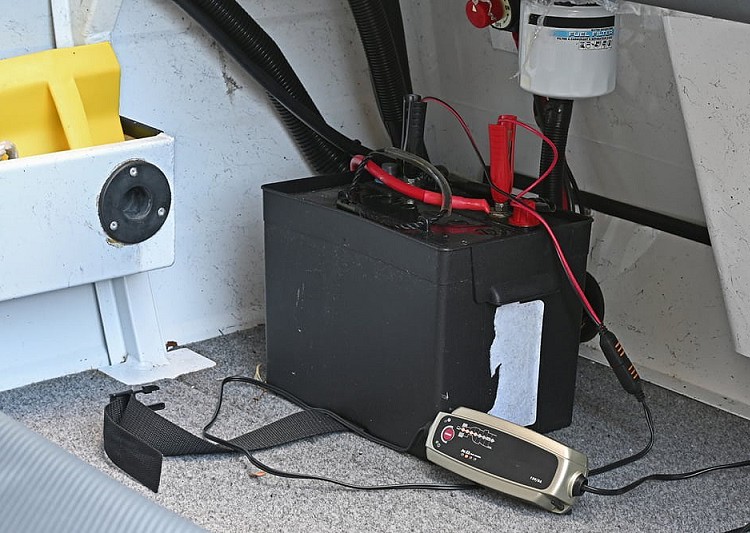
The best way to store your boat’s batteries is at home. Then you can simply charge it at home without worrying about withstanding harsh weather conditions.
If you’re unable to store the batteries at home, you can use a storage lot and use a trickle charge or solar power to charge the batteries.
Never leave your boat batteries inside your vessel without charge all winter since this will shorten the lifespan of them.
What is the best way to store a RIB boat?
There are many things you’ll want to know when storing a RIB boat. We’ll provide actionable tips you can follow, so you can easily refer back to them.
- Wash your RIB before storage.
- Store your RIB inflated.
- Spray the boat with a UV protectant or use a boat cover .
- Ideally, store the boat indoors. If left outside, store the boat upside down and elevated to let the boat dry thoroughly. Also, it’ll block small animals like rats, mice, chipmunks, or snakes from finding their way under the vessel.
- Make sure to keep the RIB away from any potential areas that rodents may appear. Rodents love to chew on rubber or plastic material.
Conclusion
RIB boats take a lot of abuse. Whether it’s being dragged onto rocky beaches, bounced against a barnacled piling, or overloaded with equipment and a crew, they can withstand a lot.
RIBs tend to last a decade without needing serious repairs.
Following the proper maintenance and storage guidelines will help them last longer and keep their effectiveness in the water.

I created this site to help people – to help you – with your boat problems. Instead of helping one person at a time, I want this website to be the “one-stop-shop” for everyone’s boating concerns. Read more.

